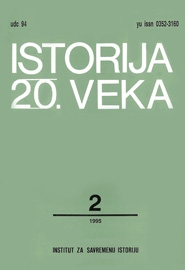SARADNJA JUGOSLAVIJE SA ZAPADNIM ZEMLJAMA 1953-1954. GODINE
YUGOSLAVIA’S RELATIONS WITH WESTERN COUNTRIES 1953-1954
Author(s): Dragan BogetićSubject(s): Diplomatic history, Political history, Recent History (1900 till today), International relations/trade, Post-War period (1950 - 1989)
Published by: Institut za savremenu istoriju, Beograd
Keywords: Yugoslavia; western countries; foreign policy; 1953-1954; economic and military aid; USSR;
Summary/Abstract: Yugoslavia almost exclusively relied on economic and military aid of the Western powers during 1953 and 1954. This aid was particularly significant to Yugoslavia as a means of overcoming the economic isolation in which the country found itself after the conflict with East European countries and as a means of strengthening its economic and defensive resources. At the same time, the aid correlated with Western strategic interests deriving from the confrontation with the USSR during the cold, war. The support given Yugoslavia was meant to be an incentive to other communist countries to free themselves of Soviet dominance. However, notwithstanding the definite interest of both sides in co-operation, the differences in their socio-political systems and their views on current world events were so vast that they seriously hampered their communication. In an effort to reduce these differences as much as possible, Yugoslavia was compelled to make certain concessions to the West in the sphere of both internal and foreign politics. As part of the general liberalization of the political and economic system the former habitual practice of requisitioning the farmers’ crops was finally abandoned and a more tolerant attitude was taken towards political opponents (release of political prisoners). The Yugoslav leadership also had to demonstrate an appropriate willingness to co-operate over the issues; of Trieste and the global defense program of the NATO. This was one of the ways of dispelling the West’s doubts regarding Yugoslavia’s possible return to the 'Soviet orbit. The effect of radical changes made in Yugoslav foreign politics during the first half of the fifties is still a matter of debate and different interpretation in domestic and foreign literature. However, a fact which cannot be denied is that in this way Yugoslavia fortified its position in the international community and avoided the general economic ruin which had otherwise threatened her.
Journal: Istorija 20. veka
- Issue Year: 1995
- Issue No: 2
- Page Range: 115-125
- Page Count: 11
- Language: Serbian

